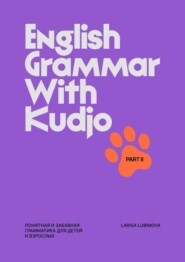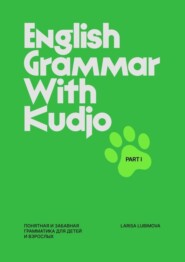По всем вопросам обращайтесь на: info@litportal.ru
(©) 2003-2025.
✖
English Grammar with Kudjo. Part 4. Понятная и забавная грамматика для детей и взрослых
Настройки чтения
Размер шрифта
Высота строк
Поля
Choose the correct option:
1 After having some camomile tea Cuba suggested ***** at home and waiting for Kudjo *****.
a staying / returning
b staying / to return
c to stay / returning
2 Luna wished they ***** to the place where Chilly had seen him the last time.
a go
b had gone
c could go
3 Chilly would rather ***** with Cuba, but he knew that Luna would make them ***** anyway.
a to agree / to go
b agree /go
c agree / going
4 None of the dogs remembered ***** Kit for ideas though he seemed ***** some.
a ask / to have
b to ask / to have
c asking / having
5 The dogs were too ***** to notice the kitten ***** the flat.
a excited / to leave
b exciting / leaving
c excited / leave
EXERCISE 7
Translate the story:
Похоже, Кит знал, где искать Куджо. Если бы собаки не были так зациклены на заброшенном лагере, они бы тоже вспомнили про подвал. Кит был уверен, что таинственный синий свет знает, где Куджо сейчас и он надеялся найти синий шар в подвале. Подбежав к маленькому подвальному окошку, Кит остановился как вкопанный. Не веря свои глазам, он залез на дерево.
Окно было наглухо заколочено досками. Жаль, что я такой маленький и слабый, подумал котенок, вздохнул и побежал искать помощи у котов района. Ему пришлось потратить немало усилий и времени, чтобы объяснить каждому коту, зачем ему опять нужно попасть в подвал. К вечеру огромная стая котов собралась около подвала, обсуждая варианты проникновения. Наконец, самый старый и самый мудрый сфинкс предложил просто поджечь деревянные доски…
(продолжение следует)
Unit 2
Modal Verbs of Ability
Before speaking about the modal verbs of ability, let’s remember three important characteristics of all modal verbs:
1. They have only one form, so you cannot add -s, -ed, -ing or make any other modifications.
2. They are used together with main verbs. You cannot put two modals together: Kudjo
return. Instead of it you can say: Kudjo will be able to return. or Kudjo can return.
You also can’t use auxiliary verbs like do/does/did with modals, because modals themselves already function as auxiliary verbs!
To make the negative form of a modal verb, add not immediately after it: Chilly couldn’t remember anything after that.
To make a question with a modal verb, put it in front of the subject: Could the dogs find him?
3. Never use to between a modal verb and a main verb: We
panic.
PRESENT ABILITY
To describe physical and mental abilities in the present as well as the possibility to perform an action, we use can/can’t or be able to / be not able to. In everyday speech, can/can’t are more common.
Kudjo can drive a car far better than Chilly. = Kudjo is able to drive a car far better than Chilly.
Can is also used to express:
Permission (informal). e.g. You can take my dad’s car.
Request (informal). e.g. Can I go out?
By the way, could expresses a more polite request. e.g. Could you help us?
Prohibition (informal). You can’t tell anybody about it.
Note:am/is/are able to would be unusual when we are commenting on something that is happening at the time of speaking:
Look! Kit can stand on his front legs! (not:
If the present ability is surprising or involves overcoming some difficulty, we can also useis/are able to:
Despite his injury Chilly is able to drive a car.
We don’t usually use be able to with stative verbs (such as see, hear, understand, believe, etc.): Cuba can’t understand what is going on. (not:








